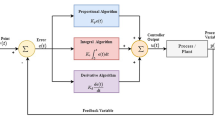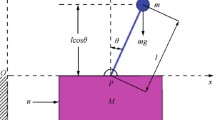Abstract
For complex systems with high nonlinearity and strong coupling, the decoupling control technology based on proportion integration differentiation (PID) neural network (PIDNN) is used to eliminate the coupling between loops. The connection weights of the PIDNN are easy to fall into local optimum due to the use of the gradient descent learning method. In order to solve this problem, a hybrid particle swarm optimization (PSO) and differential evolution (DE) algorithm (PSO-DE) is proposed for optimizing the connection weights of the PIDNN. The DE algorithm is employed as an acceleration operation to help the swarm to get out of local optima traps in case that the optimal result has not been improved after several iterations. Two multivariable controlled plants with strong coupling between input and output pairs are employed to demonstrate the effectiveness of the proposed method. Simulation results show that the proposed method has better decoupling capabilities and control quality than the previous approaches.
Similar content being viewed by others
References
F. C. Liu, L. H. Liang, J. J. Gao. Fuzzy PID control of space manipulator for both ground alignment and space applications. International Journal of Automation and Computing, vol. 11, no. 4, pp. 353–360, 2014.
X. J. Jing, L. Cheng. An optimal PID control algorithm for training feedforward neural networks. IEEE Transactions on Industrial Electronics, vol. 60, no. 6, pp. 2273–2283, 2013.
Y. P. Pan, H. Y. Yu, M. J. Er. Adaptive neural PD control with semiglobal asymptotic stabilization guarantee. IEEE Transactions on Neural Networks and Learning Systems, vol. 25, no. 12, pp. 2264–2274, 2014.
H. L. Shu, Y. G. Pi. PID neural networks for time-delay systems. Computers and Chemical Engineering, vol. 24, no. 2–7, pp. 859–862, 2000.
L. Wang, D. Z. Zheng. Meta-heuristic algorithms: A review. Control and Decision, vol. 15, no. 3, pp. 257–262, 2000. (in Chinese)
G. D. Li, Q. C. Zhang, Y. C. Liang. GA-based PID neural network control for magnetic bearing systems. Chinese Journal of Mechanical Engineering, vol. 20, no. 2, pp. 56–59, 2007.
D. Q. Feng, C. Y. Ma, Y. H. Liu. Nonlinear control system of PID neural network based on artificial fish swarm algorithm. Computer Simulation, vol. 29, no. 9, pp. 247–296, 2012. (in Chinese)
J. S. Wang, F. W. Cong, Y. Zhang. PID-ANN decoupling controller of ball mill pulverizing system based on particle swarm optimization method. Journal of Chemical Industry and Engineering, vol. 59, no. 7, pp. 1743–1748, 2008. (in Chinese)
P. Y. Zhang, X. Q.Wu, H. Q. Yuan. Research on decoupling control by MPSO-PID neural network in MIMO system. Industrial Control Computer, vol. 25, no. 2, pp. 45–47, 2012. (in Chinese)
W. F. Teng, H. P. Pan, J. Ren. Neural network PID decoupling control based on chaos particle swarm optimization. In Proceedings of the 33rd Chinese Control Conference, IEEE, Nanjing, China, pp. 5017–5020, 2014.
J. Kennedy, R. C. Eberhart. Particle swarm optimization. In Proceedings of International Conference on Neural Networks, IEEE, Perth, USA, pp. 1942–1948, 1995.
M. Clerc, J. Kennedy. The particle swarm–Explosion, stability, and convergence in a multidimensional complex space. IEEE Transactions on Evolutionary Computation, vol. 6, no. 1, pp. 58–73, 2002.
K. E. Parsopoulos, M. N. Vrahatis. Recent approaches to global optimization problems through particle swarm optimization. Natural Computing, vol. 1, no. 2–3, pp. 235–306, 2002.
A. Sedki, D. Ouazar. Hybrid particle swarm optimization and differential evolution for optimal design of water distribution systems. Advanced Engineering Informatics, vol. 26, no. 3, pp. 582–591, 2012.
H. Liu, Z. X. Cai, Y. Wang. Hybridizing particle swarm optimization with differential evolution for constrained numerical and engineering optimization. Applied Soft Computing, vol. 10, no. 2, pp. 629–640, 2010.
B. Xin, J. Chen, J. Zhang, H. Fang, Z. H. Peng. Hybridizing differential evolution and particle swarm optimization to design powerful optimizers: A review and taxonomy. IEEE Transactions on Systems, Man, and Cybernetics, Part C: Applications and Reviews, vol. 42, no. 5, pp. 744–767, 2012.
C. S. Zhang, J. X. Ning, S. Lua, D. T. Ouyang, T. N. Ding. A novel hybrid differential evolution and particle swarm optimization algorithm for unconstrained optimization. Operations Research Letters, vol. 37, no. 2, pp. 117–122, 2009.
K. V. Price, R. M. Storn, J. A. Lampinen. Differential Evolution: A Practical Approach to Global Optimization, Berlin, Germany: Springer, 2005.
X. Z. Gao, X. Wang, S. J. Ovaska. Fusion of clonal selection algorithm and differential evolution method in training cascade-correlation neural network. Neurocomputing, vol. 72, no. 10–12, pp. 2483–2490, 2009.
J. Chen, B. Xin, Z. H. Peng, L. H. Dou, J. Zhang. Optimal contraction theorem for exploration-exploitation tradeoff in search and optimization. IEEE Transactions on Systems, Man and Cybernetics, Part A: Systems and Humans, vol. 39, no. 3, pp. 680–691, 2009.
D. Bratton, J. Kennedy. Defining a standard for particle swarm optimization. In Proceedings of Swarm Intelligence Symposium, IEEE, Honolulu, USA, pp. 120–127, 2007.
M. Henze, C. P. Grady, W. Gujor. Activated Sludge Model No. 1. London, England: Int. Association on Water Pollution Research and Control, Scientific and Technical Report No. 1, 1986.
H. W. Wang, Z. B. Wu, J. Meng. Partial Least-squares Regression: Linear and Nonlinear Methods, Beijing, China: National Defence Industry Press, 2006.
Author information
Authors and Affiliations
Corresponding author
Additional information
This work was supported by the Key Project of Chinese Ministry of Education (No. 212135), the Guangxi Natural Science Foundation (No. 2012GXNSFBA053165), the Project of Education Department of Guangxi (No. 201203YB131), and the Project of Guangxi Key Laboratory (No. 14-045-44)
Recommended by Associate Editor Chandrasekhar Kambhampati
Hong-Tao Ye received the Ph.D. degree in control theory and control engineering from South China University of Technology, China in 2011. He is currently a professor in Guangxi University of Science and Technology, China. He has authored more than 20 referred journal and conference papers. He also serves as a reviewer for several international journals. He is a council member of Guangxi Association of Automation.
His research interests include computational intelligence and intelligent control.
Zhen-Qiang Li received the Ph.D. degree in information science and electrical engineering from Kyushu University, Japan in 2010. He is currently an associate professor in Guangxi University of Science and Technology, China.
His research interests include computational intelligence and optimization theory.
Rights and permissions
About this article
Cite this article
Ye, HT., Li, ZQ. PID Neural Network Decoupling Control Based on Hybrid Particle Swarm Optimization and Differential Evolution. Int. J. Autom. Comput. 17, 867–872 (2020). https://doi.org/10.1007/s11633-015-0917-7
Received:
Accepted:
Published:
Issue Date:
DOI: https://doi.org/10.1007/s11633-015-0917-7




